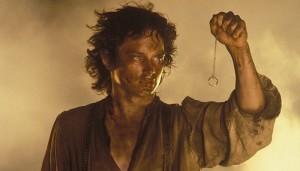
Still with me? Great. If you missed Part 1, go read it or you’ll be lost like Bilbo in Mirkwood.
♦ Analysis:
To understand how Sauron can help us succeed in life, we have to understand Sauron. And in understanding him, we might just understand ourselves better.
In the beginning, Mairon (aka Sauron) was “on the side of the angles,” as Moriarty would say. What’s more, he was an angel. He was created as a good being, but Eru also gave him free will.
What’s interesting is that he didn’t side with Melkor right away when that Ainur rebelled. If there’s one virtue Sauron possesses in spades, it’s loyalty. If you aren’t familiar with his history, it’s odd to think of him as being loyal.
He remained loyal to Eru until after being assigned to Aulë the Smith. I think it was being out of Eru’s direct presence cooled Sauron’s allegiance. Sauron has always been a fan of order and organization, and perhaps seeing how Eru let others do his will bothered Sauron. Many of the other spirits were probably less interested in efficiency and precision than Sauron thought appropriate. If Eru was so great, why would he let these incompetents execute his will?
The next factor that I think influenced Sauron’s flipflop was being absorbed in the act of craftsmanship himself, something that before the material world existed had been the domain of Eru only. Now Sauron could imitate Eru by crafting his own creations.
Pledge allegiance to the dark side:
When Melkor came on the scene, the soil of Sauron’s heart was ready for planting of the evil seed that would corrupt him. Unlike Eru, Melkor effected “his designs quickly and masterfully.” Sauron admired those traits, as well as honoring Strength in general.
One wonders if Sauron would’ve sided with Melkor if he’d known the corruption that would come? Remember, Sauron wanted to make order and bless the earth’s inhabitants. At this point, the power had yet to blind him. Power wasn’t an end in itself for him yet.
As Sauron became chief lieutenant, he worked tirelessly for the triumph of Melkor. Sauron truly “adored” his lord. Sauron’s schemes topped even Melkor’s. This had to be a boost to the ego!
I picture Melkor as being rather two dimensional. He worked with “the furious haste of his malice.” He might have been powerful, but he wasn’t too bright if that was his main MO. That’s an unsupportable tactic. Speaking of tactics, did he even have a strategy? The Valar captured Melkor, but not Sauron. This lends weight to my theory.
Even Dark Lord feel loss:
What did Sauron feel when he lost his beloved master? I’m willing to speculate… Confusion about what to do now. Anger at the Valar for stopping a force for progress. Emptiness at losing a master. Loss at having his efforts rendered useless.
I’m going out on a limb and suggesting the Kübler-Ross model, also known as the Five Stages of Grief, would fit. They’re not just for dealing with the death of loved ones or the diagnosis of a terminal illness. The stages apply to most loss/trauma. They’re good to keep in mind when you face bad times.
-
Denial — Melkor the great Dark Lord couldn’t be defeated!
-
Anger — Why would this happen? How dare the Valar do this!
-
Bargaining — Maybe the Valar will be willing to undo this if…
-
Depression — What’s the point? He’s gone and I’m in hiding.
-
Acceptance — With enough skill and cunning, nothing is impossible for me.
Sauron coped by breeding orcs and preparing for Melkor’s return. See the loyalty I was talking about? He could have decided to usurp what remained of Melkor’s power and deny his lord. But no.
Melkor returned with power, then left to apply his wily ways to Men. During this, Sauron operated from his Isle of Werewolves as he fought the Elves. He didn’t stay lord for long, though. When Luthien and Huan defeated him, he chose to abandon the Isle rather than being shamed in front of Melkor. What would Melkor want him to do, I wonder? Is this the first slipping of loyalty from Melkor?
Exiled again, Sauron couldn’t help his lord anyway. Melkor fell during the War of Wrath and was pretty much banished into the Shadow Realm.
Sauron is by this time an escape artist 1000x better than Houdini. But here he changes up his tactics. He’s running out of options, so he swings from the vampire bat end of the spectrum to the angel of light end. While it didn’t help in this situation with the Valar, it worked wonders when he applied it to the Elves and Men. Sauron is adept at transforming failed plans into successes. Sometimes you just have to change audiences. You can’t please everyone. You need to find a niche. (Critical if you’re running a business, but also useful in daily life.)
Gray, going on pitch black:
Even now, though, he isn’t “wholly evil.” His heart is in the right place as he works for “the reorganizing and rehabilitation of Middle-earth.” That’s fine. We need that in society. But power corrupts, and absolute power corrupts absolutely. The fatal flaw: he began “lusting for Complete Power.” Victory became an end in itself. The need to win is a strong one, and it calls to all of us. Sometimes it’s better to lose, though, if winning would mean compromising our moral code or being counter productive to our goal. Eyes on the prize is a saying for a reason! Yes, the journey is as important as the destination, but if you don’t know where you’re going goal-wise, any way will get you there. Or in this case will take you to Hell.
Sauron uses his lovely form as Annatar, “Lord of Gifts,” to co-opt the Elves. He’s discovered that force and werewolves aren’t always the best means to his end. He’s learning his audience. His manipulation and deception abilities are evolving. Level up!
As is often the problem with authorities who want to protect their people and make them prosper, Sauron decided that controlling the leaders of the people would be the best option. The logic is sound: people screw up because their leaders screw up. Make sure the leaders “do the right thing,” and the people will follow. Peace, protection, and prosperity will blossom! That’s a breath away from a prison, too. Security and freedom must be balanced.
Sauron reinforced his plan with the rings by making the One Ring to further control them. It’s like a fail-safe.
Freeeedom!:
Not surprisingly, this all backfired when the unwittingly controlled discovered their situation. Rebellion followed. We see this in history: an overbearing authority squeezes the people until they push back.
When Numenor came into the picture, Sauron realized he was outclassed. This takes perception to recognize and courage to admit. People are destroyed when they keep fighting losing battles. Sauron takes the “I surrender” tact again.
Sun Tzu would approve: “Pretend inferiority and encourage his arrogance.“
Sauron has discovered one of the most effective tools to defeat a foe: working from the inside. A cancer is much harder to eradicate than a rabid racoon chewing on your leg. People will often try to gain your trust only to stab you in the back later. To put it in a positive light, often the best way to reform a broken system is to work on it from inside the belly of the beast.
Sauron aimed for hearts and minds, targeting the people’s religion. We see that tactic all the time in real life. That’s why it’s important to know what you believe. The Dark Lord shows more of his corruption as he decrees human sacrifices. This is a good way to motivate the Numenoreans into subduing other races.
This all harks back to Sauron’s turning from Eru to Melkor. He wants the same for “his people.” Melkor’s ways were efficient, after all. And where’s Eru through all this anyway? Well, he finds out soon enough. His careful scheme to have the last block to his domination throw itself on his other enemies’ swords goes to waste when Eru intervenes. This is totally unexpected.
Good on paper:
Let’s break this down: The plan to have enemy defeat enemy was good. Getting other forces to do his work for him was genius. It’s all part of 3-D Negotiation*, which advocates setting up the pieces on the board long before meeting at the negotiating table. (It’s a great read and relevant to your interests no matter who you are.) We see again Sauron’s tactics are improving.
Again, Sun Tzu would approve: “The supreme art of war is to subdue the enemy without fighting.“
The problem came when out of the blue Eru shows up. Things happen in life that no one can foresee. Acts of God, some people call them. Sauron rolls with the punches, though, and escapes. Again. He’s nothing if not adaptable!
Next problem: the Alliance. Sauron was on a roll before they dropped caltrops. His mistake was facing them personally. He didn’t have a choice, though. I’m sure his pride didn’t help either. He put all his power, all his cards, on the table. Double down! His failure to hold anything in reserve or to have a contingency plan lost him the Ring, a finger, and all but a fragment of his power. Don’t be Sauron.

You shall not pass!:
In the main The Lord of the Rings* plot, Sauron seeks the Ring covertly, but he doesn’t realize, or doesn’t acknowledge, Gandalf is around. Now, it’s easy to underestimate Gandalf. He’s not throwing fireballs or commanding undead. But the Wizard has knowledge. Intel about the Ring and Sauron’s desire for it are deadly weapons. They keep the Hobbits on the run, create the Fellowship, and send Frodo on his quest.
Going back to 3-D Negotiation, Gandalf achieved the holy grail: knowledge of what his opponent’s true goals and the extent of their willingness to achieve them. Sauron’s “no deal option” – what he would be left with if he deserted his plan to get the Ring – was defeat. That alone meant a win for Gandalf. Sauron had to fight. He had to get the Ring. With the Ring as a hostage, the Fellowship could manipulate the great Dark Lord. And they did just that.

The Fellowship made Sauron so nervous that he launched his forces before he planned. He played the Fellowship’s game. Desperation led him to desperate measures. They failed. After millennia of thinking outside the box for solutions/escapes, he fell into their trap. His all or nothing bid destroyed him.
Conclusion:
Sauron “outlived” a more powerful spirit, Melkor, and ruled on Middle Earth in various forms for millennia. He was supposed to be an unstoppable Dark Lord. The creator Eru had even intervened to stop him. Sauron had a toolbox of excellent tactics, all of which he used well. But what destroyed him? A couple Hobbits? No. It was a series of small defeats, and I don’t just mean the ones that weakened him over the years. He lost the element of surprise, which is the first domino. Then he lost the initiative, letting others call the shots.
♦ What does Sauron represent?
Villains embody themes, morals, warnings, dangers. They are symbols and parables that help us live better.
So what about the Dark Lord Sauron? This is just my opinion, but I believe he embodies a number of themes:
- The dangers of worshiping organization and efficiency alone.
- The danger of losing sight of the end goal.
- The temptation to be corrupted by power.
- The cost of progress without concern for humanity/life.
- The Devil.
- The corruption of good.
- The danger of pride.
This isn’t exhaustive, of course.
♦ What the Dark Lord Sauron teaches us about how to succeed in life:
Use 3-D Negotiation: set up the pieces and players before the meeting, know their goals and your goals, know their no-deal option and your no-deal option. Go read the book. Seriously.
Slow down and think things through when you’re in desperate situations. Try not to get in them in the first place, but when you do, don’t play your opponent’s game. Make them play yours.
Don’t let victory become an end in itself. Remember what you’re striving for.
Find a niche. Not everybody will love you and/or what you do. Find the ones who do and stop wasting time.
Be adaptable. Security really comes from ability to evolve with the times. Adapt or die.
Knowledge is power, and it goes both ways. Be careful who you tell things to. Use your knowledge about others wisely. It can build them up or destroy them.
Be careful who you throw your lot in with. Everyone has enemies, especially someone powerful. So remember this before you side with somebody.
Efficiency and organization are good as long as they don’t become all-consuming. Don’t let OCD take over!
Power corrupts easily. Do a self-check on your use of it if/when you are blessed enough to hold it.
The road to Hell is paved with good intentions. And we’re great at rationalization! Reality check required.
Making a good impression works wonders. People judge by appearances first. Three seconds is all it takes for somebody to judge you and your motives.
Sometimes a retreat is the best option. Strategic withdrawal gives you a chance to regroup.
Work from the inside for change. It’s always easier to work from inside the defenses. It’s still not easy, but it’s better than the alternative.
Keep your eyes open. Opportunities are everywhere.
♦ Mach(iavelli) Tip:
“Men judge generally more by the eye than by the hand, for everyone can see and few can feel. Every one sees what you appear to be, few really know what you are.”
♦ Tzu Tip:
“He will win whose army is animated by the same spirit throughout all its ranks.“
♦ Further reading:
Understanding Sauron: How he can help us succeed in life – (Part 1)
Villain Matrix Stats: Dark Lord Sauron – Silmarillion, Hobbit, Lord of the Rings
♦ TV Tropes:
TV Tropes for Lord of the Rings books
TV Tropes for Lord of the Rings movies
Agree? Disagree? Let us know in the comments. Perform your own villain assessments with the Villain Matrix. Use the Villain Matrix spreadsheet that comes free when you join the Research Team, where you’ll also get our newsletter with its exclusive updates and content.
(*Affiliate link, meaning you get a movie/DVD/book/whatever, I get a few pennies, and everybody’s happy!)
1 comment
Comments are closed.